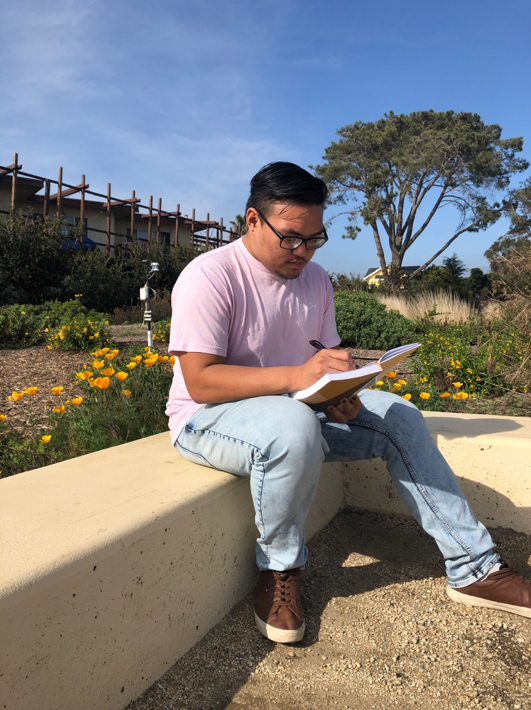By Kayla Matzek
Tomas Palpallatoc, a first-year UC Santa Barbara sociology major, won second place at UCSB’s first student Poetry Slam of the winter quarter. “I was surprised. I didn’t even expect to make it to the top four, and then I made it to the top two,” Palpallatoc said.
Following this victory, Palpallatoc advanced to the Poetry Slam final round where he placed fifth, guaranteeing him a spot on the UCSB slam team and a trip to Houston, Texas in April to participate in the College Unions Poetry Slam Invitational (CUPSI).
The Poetry in Performance (PIP) student group holds three poetry slams during the winter quarter to determine who qualifies to be among the five members of the UCSB slam team. PIP is a spoken word collective, according to its Facebook page. “Our goal is to help members perform spoken word, create a slam team, and forge our own truths,” it reads.
The College Unions Poetry Slam Invitational (CUPSI) is an opportunity for campuses with Poetry Slam programs to compete for top honors and share their work with a large group of people. The college national slam is a program where “everyone’s voice is welcome,” according to the group’s social media pages.
Palpallatoc started writing poetry in middle school, at Holy Name School in San Francisco, but not the way he does now. “I’d like to say I’m a bigger self-critic than anyone else could tell me,” he said. He puts more emotion and experience in his poems now, being self-critical of every minor detail.
Tomas Palpallatoc, a first-year UCSB sociology major, writing fresh poetry in preparation for his final Poetry Slam.
The young college poet also writes for the Bottom Line, a UCSB student-run weekly newspaper. He has contributed four articles so far and hopes to share more. Palpallatoc is interested in taking several courses through the Humanities and Fine Arts Department, such as a spoken word course and “Intro to Acting.”
Rick Benjamin, a UCSB Comparative Literature professor, has Palpallatoc in his “Poetry and Community” course where the students write their own poems and run poetry workshops with junior high students. “Tomas’ poetry is outstanding,” Benjamin said. “He’s a natural born poet. It runs through his blood.”
The early winter competition at UCSB was the second poetry slam Palpallatoc had ever done. He has learned that he does best if he does not think about the slam as a contest. “It’s a way for poets to test out how they rank up against each other, which I think is contradictory to poetry itself,” he said. Palpallatoc believes sharing poetry should not be a competition. He participates for the fun of it. “It’s about expressing your feelings and emotions and telling that story you want to tell,” he said.
UCSB’s Poetry Slam participants posing for a picture after sharing their best poems during the first round out of three on January 18 in the Theater and Dance building.
There were 10 competitors in the slam, and five judges are picked randomly from the audience at each event. “You have to read the energy in the room,” Palpallatoc said about picking judges on the spot. “There tend to be pieces that connect with an audience and get good reactions more frequently, emotionally hitting ones usually.”
Participants have to come prepared with their poems learned by heart, so they can recite them when the time is right. Palpallatoc explained that during the slam participants choose what poems they recite next based on a couple different factors. “Who went before you, the type of audience you’re in front of—it changes what poems you should do in that moment,” he said.
Palpallatoc says it is hard but necessary to have one’s poems criticized. “Getting shut down is such a negative thing, especially since poetry is an open platform,” he said. He believes everyone should feel comfortable with sharing their art, even if they are beginners. “It feels so bad to put your heart and soul and all your emotions into one piece, and then have someone not like it,” he said.
Kayla Matzek is a third-year student at UC Santa Barbara, majoring in Writing and Literature. She is a Web and Social Media Intern with UC Santa Barbara’s Division of Humanities and Fine Arts.



